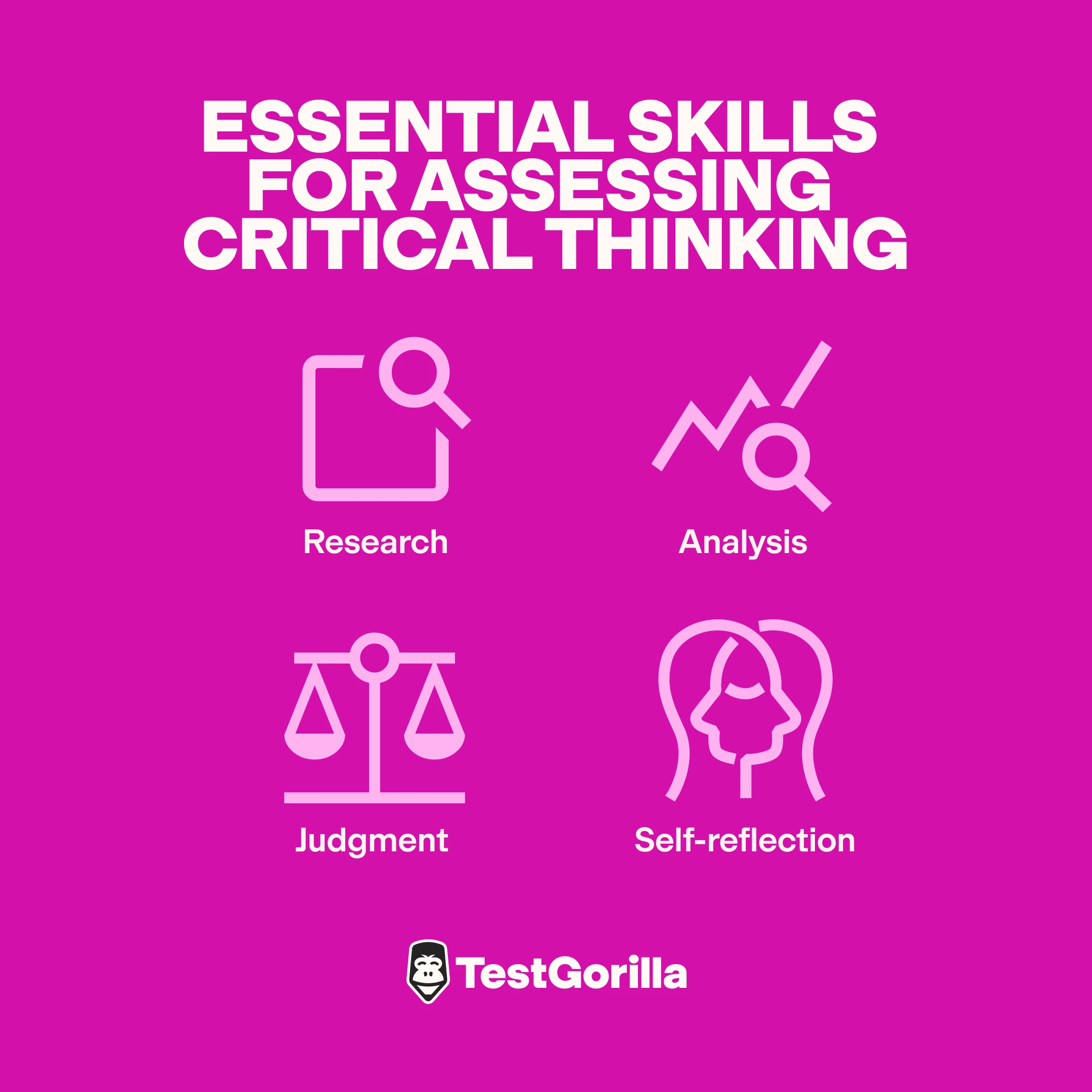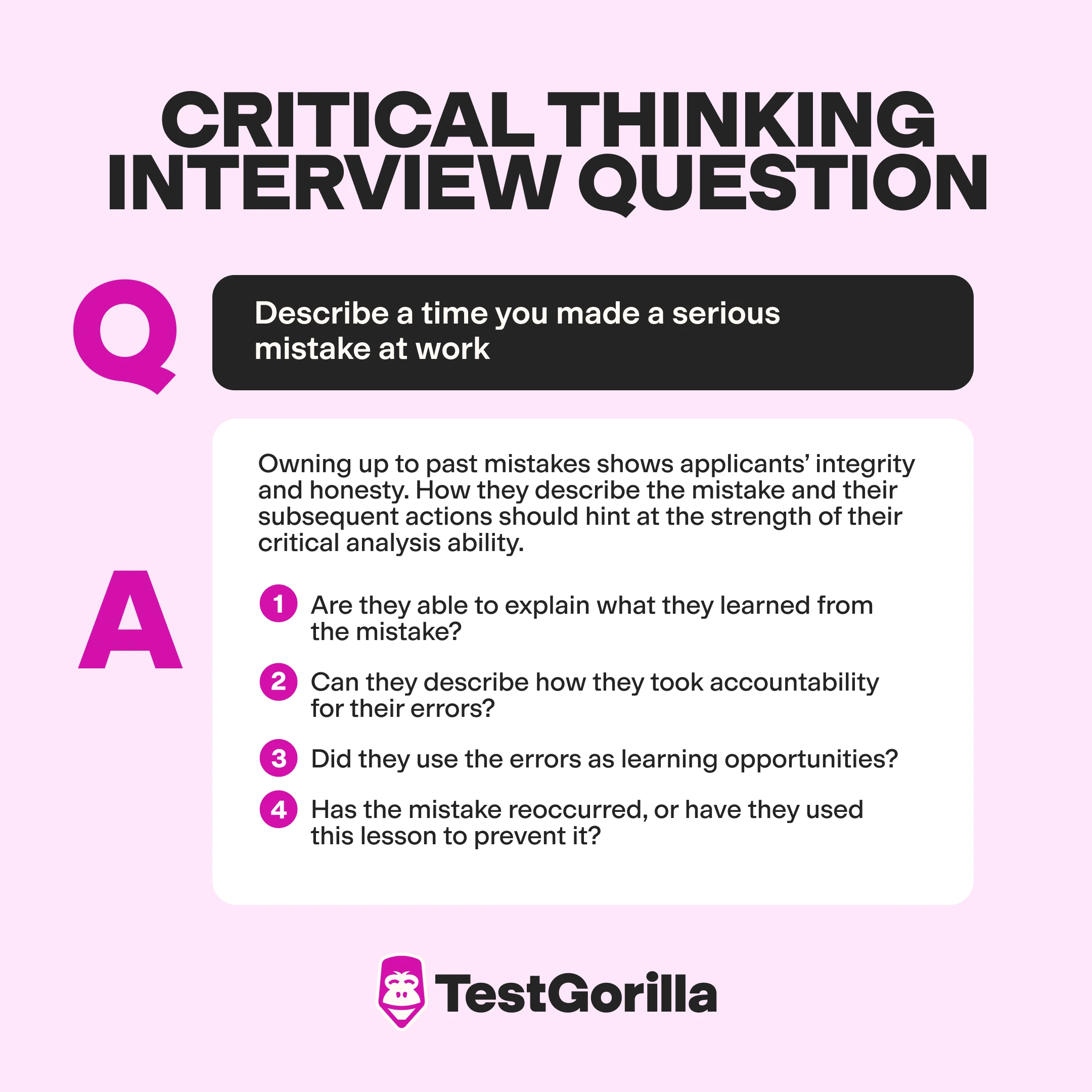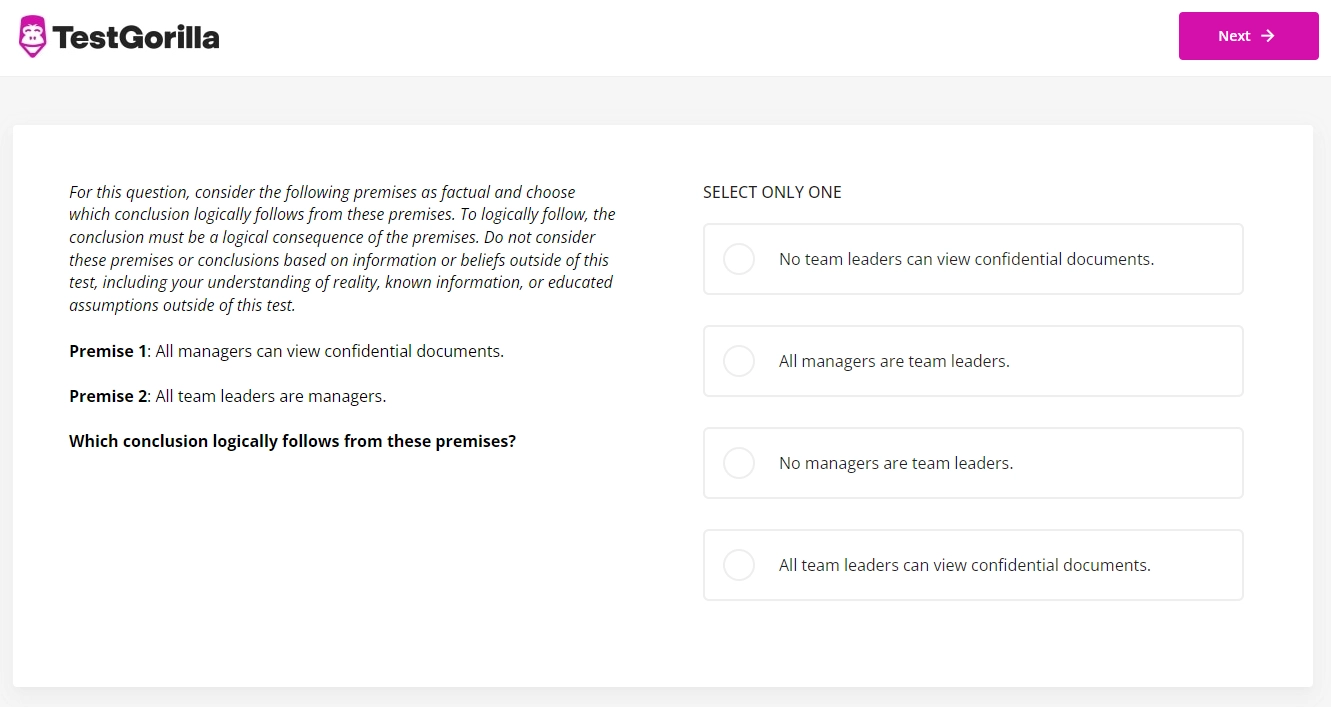17 critical thinking interview questions to find the perfect candidate
Find top critical thinkers for your open roles today
Critical thinking is an important skill in any role, and its significance only increases the more complex responsibilities employees have.
The best way to ensure your candidates have the skills to tackle sophisticated problems is to screen applicants using a Critical Thinking skills test and create a shortlist of quantifiably competent interviewees.
The next step is to ask thought-provoking interview questions. This interview process is tricky, but to help you out, we’ve created a list of 17 critical thinking interview questions to ask candidates.
Table of contents
- The importance of thought-provoking interview questions
- 17 critical thinking interview questions and answers
- Summary of all 17 critical thinking interview questions
- Uncover critical thinking with talent assessments and in-depth interview questions
- Never miss great talent with our skills tests and critical thinking interview questions
The importance of thought-provoking interview questions
Research shows that the demand for critical thinking and analysis is growing at a faster rate than any other skill group, likely thanks to the increased need for critical analysis when navigating technological change.
To meet this demand, hiring managers need a robust system for assessing critical thinking skills for most positions. When we talk about critical thinking, we refer to a range of sub-skills, including:
Research
Analysis
Judgment
Self-reflection
These skills are essential to many business processes, particularly for managers who must evaluate complex variables to make effective business decisions.
For example, critical thinking skills are necessary to effectively re-evaluate processes during agile project management, which drives innovation.
The problem with critical thinking skills is that it’s difficult to identify them relying solely on resume evaluation. Anyone can write “critical thinking skills” on a resume, but it doesn’t make them critical thinkers.
That’s where talent assessments come in. Skills testing measures candidates’ critical thinking skills, ensuring shortlisted candidates meet a certain benchmark. Then, asking interview questions for critical thinking gives you a well-rounded understanding of a candidate’s aptitude for objective analysis. The questions should be thorough enough to give you insight into a candidate’s motivations, problem-solving style, and decision-making skills.
17 critical thinking interview questions and answers
Asking interview questions about critical thinking gives you insight into a candidate’s thinking style as well as relevant sub-skills, such as:
Decision-making
Problem-solving
Information processing
Deductive reasoning
Conflict resolution
In candidates’ answers to all these critical interview questions, look for their ability to:
Give a clear, concise, structured answer – for example, using the STAR method, outlining the situation, task, action, and result
Illustrate their points with specific examples
Reflect honestly on their strengths and weaknesses
Show self-awareness about areas for improvement
So, what are some critical thinking interview questions?
1. How do you go about completing a task without clear information?
Answers to this question should show how the candidate would perform in time-sensitive environments, where workers often make decisions with incomplete information.
Based on the answers, gauge how the candidate would handle the lack of information in complex situations, including:
How they review the information they have
How they use creative thinking to fill in the blanks
What experiences, resources, or training they draw on to make educated guesses about missing data
How they decide on a solution
Whether they continually use analytical skills to re-evaluate their chosen solution as they receive more information
What the outcomes have been in past instances of doing tasks while missing information
2. What is the most difficult work-related decision you’ve had to make?
This critical thinking interview question probes candidates’ ability to make sound decisions under pressure. A good answer shows a clear thought process and measured judgment to select a course of action.
Look out for candidates who can:
Lay out all the variables involved in the decision
Explain why these factors were at odds with each other and what the stakes were
Reflect on how they handled the stress of the decision
Show that they created a logical system for making the decision – and stuck to it
Display willingness to take ownership of their decisions even in difficult circumstances, such as layoffs
3. How do you process new ideas and approaches?
Open-mindedness is central to critical thinking. Candidates shouldn’t fear abandoning traditional methodologies if a superior alternative emerges. Equally, they should exercise their judgment to evaluate whether a new method meets the bar.
When a candidate answers this question, look out for:
Awareness of new ideas and approaches emerging in their field – this is a sign that a candidate is proactive and engaged in their work
An established process for fact-checking or testing new approaches
Ongoing reevaluation of new methods and ideas
Adaptability and willingness to consider ideas that contradict their way of doing things
4. How do you respond to opposing viewpoints?
Critical thinking depends on a person’s ability to weigh both sides of an argument. Even when one course of action is worse than another, candidates should be able to respond to opposing perspectives respectfully and constructively.
Candidates with strong critical thinking skills:
Show they understand opposing viewpoints
Practice active listening to ensure everyone feels heard
Identify the conflict between others’ ideas and their opinion
Address this conflict respectfully and back up their views with hard evidence
Where applicable, shift their viewpoint according to new information or reach a suitable compromise
5. How quickly do you make decisions?
In a fast-paced work environment, employees must act swiftly and decisively. This critical thinking interview question asks the candidate to expand on their decision-making process. Strong answers strike a balance between careful consideration and urgency, showing:
An understanding of decision-making timelines in their role or industry: quicker isn’t always better, and making snap decisions is often a sign of arrogance
An awareness of the time needed to make different types of decisions and which stakeholders are involved
Methods for assessing how much time they have to make a decision and how they manage their tasks to stay on track
Variables they prioritize in decisions they have limited time to make
6. Have you ever anticipated a complex problem before it arose? How did you deal with it?
This critical thinking interview question separates the proactive thinkers from the passive ones, helping you spot candidates who plan and anticipate risks – an invaluable skill in any organization.
Good answers to this question show:
A solid understanding of the key functions or outputs of their business and the resources these rely on
Proactive evaluation of changes to this environment
Risk assessment and risk management skills, and knowing when to take action and when to hold off
7. What work-related advice would you give to former employers?
This question gauges a candidate’s propensity to voice criticism and whether they express it constructively or negatively. There’s no right or wrong answer here. Candidates simply need to thoughtfully explain suggestions for managers in their previous roles.
“Green flags” when looking at candidates’ answers to this question include:
An awareness of the factors that went into their bosses’ decision-making
A clear explanation of their disagreements or amendments to these policies
Practical suggestions for improving the situation
A “red flag” would be making personal or non-constructive remarks or failing to show understanding and respect for former employers.
8. How often do you ask coworkers for help?
Workers should know when to seek help from others while working on a project. They shouldn’t burden co-workers with work they could do themselves, nor should they be too stubborn to proceed without some outside opinion or help.
Keep an eye out for candidates who:
Understand which tasks in their role are suitable for collaboration and which require independence
Show willingness to look for their own solution before asking others for help
Know their limitations, particularly within time constraints – for example, when to ask for help from a colleague who can complete a task faster
Awareness of and respect for their colleagues’ priorities
A willingness to learn so this situation is less likely to repeat itself
9. How should friction between team members be dealt with?
Conflict resolution is a skill that’s hard to come by for hiring managers. In work environments with people with different opinions and values, it’s important to have someone who can defuse conflict situations with a proactive, patient, and impartial approach.
Look for candidates who:
Know the difference between healthy and toxic conflict
Understand organizational or legal protocols for conflict resolution – for example, which situations should be dealt with formally
Resolve conflicts using non-violent communication
Are familiar with processes for restabilizing the team after conflict resolution
10. What is the most innovative work-related idea you have come up with? How did it benefit the organization?
This question asks candidates to describe past experiences of thinking outside the box to deliver a new solution. Having proactive problem-solvers in your organization helps it stay ahead of the curve.
A good answer to this critical thinking interview question shows that a candidate:
Is on the lookout for opportunities to innovate or optimize processes
Comes up with practical ways to implement their solutions
Stands up for their ideas if they’re not met with enthusiasm initially
11. Describe a situation when you received negative feedback you didn’t understand.
If applicants have received negative feedback they didn’t understand, getting defensive should not be their first instinct. An employee who analyzes situations critically should know that the feedback could enhance the quality of their work and strive to understand it better.
Look out for candidates who show:
A willingness to receive critical feedback
The ability to restate what they heard and ask for clarifications on aspects that elude them
A keenness to follow up with the supervisor and ask about their progress since the feedback was given
12. Describe a time you made a serious mistake at work.
Owning up to past mistakes shows applicants’ integrity and honesty. How they describe the mistake and their subsequent actions should hint at the strength of their critical analysis ability. Ask yourself:
Are they able to explain what they learned from the mistake?
Can they describe how they took accountability for their errors?
Did they use the errors as learning opportunities?
Has the mistake reoccurred, or have they used this lesson to prevent it?
13. Describe a digital skill you need to improve.
Companies worldwide are experiencing massive shortages of digital skills, even among younger workers. One UK-based survey found that employers believed some of the top skills graduates lacked were:
Basic IT skills
Data ethics
Machine learning
Programming
Data communication skills
A good answer to this question should show that candidates understand the importance of mastering digital processes.
It also shows that the candidate has the critical thinking skills needed to recognize these weaknesses in their digital know-how, particularly where they impact their job.
Ask them if they are taking courses or reading books to improve.
14. Do you have any methods for improving your problem-solving skills?
Problem-solving skills are an adjunct of critical thinking that prepares candidates for handling challenging assignments by prioritizing tasks, planning and executing strategies, and anticipating additional problems.
To improve their problem-solving skills, candidates can:
Share ideas with coworkers to learn new problem-solving strategies
Improve analytical skills to assess the root causes of problems
Practice creative and critical thinking
Assessing your applicants’ problem-solving skills is quick and simple with our Problem Solving and Critical Thinking tests. Use these tests for a data-driven hiring process.
Spot top problem-solvers without bias
Find out how our skills tests can help you find the best hire for your open position.
15. Have you ever received negative feedback from senior management?
Negative feedback from senior managers may seem jarring, but employees should see it as a wake-up call and an opportunity to improve performance. Your applicants should show their critical thinking aptitude by explaining:
How they accept negative comments from senior leadership
What they do to implement the necessary changes to their work
How they use it as a learning opportunity
Ask your candidates to provide an example of a time they received negative feedback and ask extra questions to see how the criticism improved their work.
For instance, if a senior manager reproached an applicant for not motivating a team effectively, you may ask, “How did your motivational strategies change after that?”
16. How would you coach an employee who’s failing to meet targets?
Coaching enables underperforming team members to enhance their approach to the task and achieve their goals more efficiently. Successful coaching demands critical thinking skills on the mentor’s part to inform the best strategy.
Consider whether your applicants have coaching experience and can provide an example of a situation when their coaching strategies helped an employee who was failing to meet targets.
Strategies they could mention include:
Scheduling one-on-one meetings to discuss company targets
Using efficient communication to share their expectations with the employee
Evaluating the reasons why the team member is struggling
Looking for ways to help them address challenges with training or mentorship
17. How do you ensure your team trusts your choices?
Team management requires strong critical thinking skills because managers must understand what motivates each of their team members, communicate their decisions in a way that resonates with them, and project reliable authority.
Examples of how candidates could do this include:
Being transparent in their decision-making process
Admitting mistakes
Communicating effectively
Using team-building activities
Holding regular team meetings
Whichever method they use, applicants should describe the outcomes of their processes to help you appraise their managerial expertise.
Summary of all 17 critical thinking interview questions
What are examples of critical thinking questions? Here’s our full list of critical thinking questions and answers.
Strategic thinking interview questions | Examples of what to look for |
1. How do you go about completing a task without clear information? | The steps they take to fill in the blanks How they decide on a solution |
2. What is the most difficult work-related decision you’ve had to make? | Laying out the variables involved Using logical reasoning for making difficult decisions |
3. How do you process new ideas and approaches? | Awareness of new ideas in their field Ongoing re-evaluation of new methods |
4. How do you respond to opposing viewpoints? | The thinking process involved in identifying the conflict Addressing this conflict respectfully |
5. How quickly do you make decisions? | An understanding of decision-making timelines Awareness of the time needed for informed decisions |
6. Have you ever anticipated a problem before it arose? How did you deal with it? | An understanding of the key functions or outputs of their business An evaluation of changes to this environment |
7. What work-related advice would you give to former employers? | Awareness of the factors that went into their bosses’ decision-making Practical suggestions for how to improve |
8. How often do you ask coworkers for help? | Willingness to look for their own solution before asking for help Awareness of and respect for their colleagues’ priorities |
9. How should friction between team members be dealt with? | An understanding of healthy versus toxic conflict Non-violent communication skills |
10. What is the most innovative work-related idea you have come up with? How did it benefit the organization? | Practical ideas for how to implement solutions Willingness to stand up for their ideas |
11. Describe a situation when you received negative feedback you didn’t understand. | Restating what they heard Asking questions about the aspects they didn’t understand |
12. Describe a time you made a serious mistake at work. | An ability to explain what they learned from the feedback Accountability for their errors |
13. Describe a digital skill you need to improve. | An understanding of which digital skills are important to their job A plan for how they plan to improve this |
14. Do you have any methods for improving your problem-solving skills? | Sharing ideas with coworkers Improving analytical skills to assess the root causes of problems |
15. Have you ever received negative feedback from senior management? | How they accept negative comments from senior leadership What they do to implement the necessary changes |
16. How would you coach an employee who’s failing to meet targets? | Scheduling one-on-one meetings to discuss company targets Communicating expectations clearly |
17. How do you ensure your team trusts your choices? | Being transparent in their decision-making process Admitting mistakes |
Uncover critical thinking with talent assessments and in-depth interview questions
In traditional hiring, the earliest you could assess critical thinking skills is during the interview. Hiring managers spend much time and effort inviting candidates to interviews and prepping the questions, only to find they aren’t suitable.
This situation doesn’t happen if you screen candidates using TestGorilla’s Critical Thinking test, which evaluates their basic critical thinking abilities with questions like this:
Using skills-based hiring during the shortlisting process lets you cut out the time you’d otherwise spend checking if candidates have critical thinking skills.
Instead, you can look more closely at how they approach problems with interview questions for strategic thinking. Then, you can evaluate whether their approach would work in your business environment.
This approach leads to better hires and a shorter time to hire. For example, the game development and publishing studio Visionaries FZ-LLC saves 15 hours per hire by only inviting candidates to interview if they score above 80% on TestGorilla’s assessment.
Don’t waste time finding skilled candidates.
Create your first multi-measure assessment for free with TestGorilla today.
Never miss great talent with our skills tests and critical thinking interview questions
Critical thinking is at the top of the list when deciding what to assess with your interview questions. In this article, we’ve broken down:
Why critical thinking skills are so important
A list of the best critical thinking questions for interview candidates
How skills testing can help you create even better thought-provoking questions for interviews
To learn how to get started with skills testing, sign up for a demo with one of our experts today.
You can also look around our platform yourself by taking a product tour.
Or, if you’re ready to get started straight away, sign up for our Free forever plan now.
Related posts
Hire the best candidates with TestGorilla
Create pre-employment assessments in minutes to screen candidates, save time, and hire the best talent.
Latest posts
The best advice in pre-employment testing, in your inbox.
No spam. Unsubscribe at any time.

Hire the best. No bias. No stress.
Our screening tests identify the best candidates and make your hiring decisions faster, easier, and bias-free.
Free resources
This checklist covers key features you should look for when choosing a skills testing platform
This resource will help you develop an onboarding checklist for new hires.
How to assess your candidates' attention to detail.
Learn how to get human resources certified through HRCI or SHRM.
Learn how you can improve the level of talent at your company.
Learn how CapitalT reduced hiring bias with online skills assessments.
Learn how to make the resume process more efficient and more effective.
Improve your hiring strategy with these 7 critical recruitment metrics.
Learn how Sukhi decreased time spent reviewing resumes by 83%!
Hire more efficiently with these hacks that 99% of recruiters aren't using.
Make a business case for diversity and inclusion initiatives with this data.
























